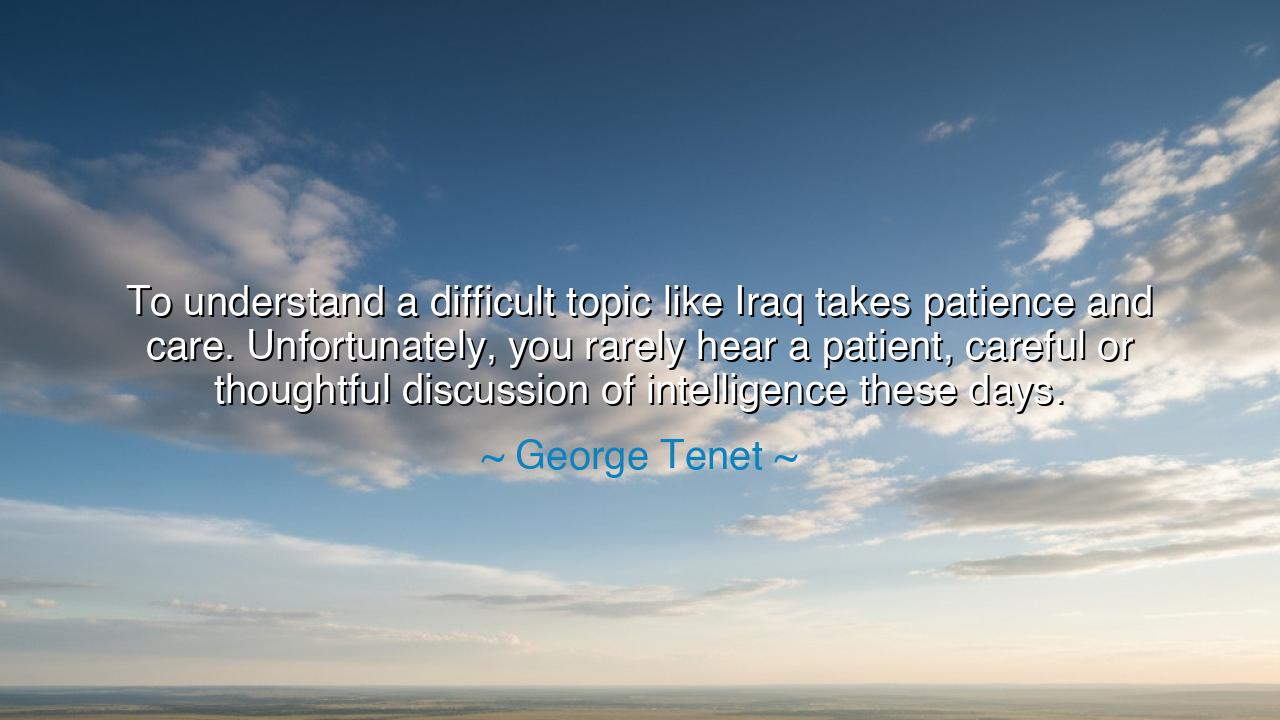
To understand a difficult topic like Iraq takes patience and
To understand a difficult topic like Iraq takes patience and care. Unfortunately, you rarely hear a patient, careful or thoughtful discussion of intelligence these days.






The words of George Tenet, “To understand a difficult topic like Iraq takes patience and care. Unfortunately, you rarely hear a patient, careful or thoughtful discussion of intelligence these days,” are both a lament and a warning. They arise from the deep corridors of power, spoken by one who bore the weight of knowledge few could share. Beneath them lies the eternal struggle between truth and haste, between understanding and opinion, between the quiet discipline of study and the loud clamor of judgment. Tenet, former Director of the Central Intelligence Agency, was a man who knew well that the world’s gravest decisions are made not in calm reflection but in the storm of politics and fear—and it was this imbalance that drew his sorrow.
When he speaks of Iraq, Tenet invokes not merely a country, but a crucible of history—a land that became the stage for one of the most complex and controversial chapters of the modern era. To “understand” such a topic, he says, requires patience and care, virtues that the ancients held sacred. For wisdom, they taught, is not the child of speed but of stillness. Yet in the rush of nations, in the fever of vengeance after September 11th, the world sought not to understand but to act. And in that haste, intelligence—meant to be the instrument of truth—was twisted, simplified, and consumed by impatience.
Tenet’s words echo like the counsel of an elder to his descendants: Be wary of the noise that drowns out discernment. In every age, those who hold power are tempted to mistake certainty for understanding. But certainty is a weapon, while understanding is a shield. The former cuts swiftly and without reflection; the latter guards against folly. When Tenet laments the absence of “patient, careful, or thoughtful discussion,” he speaks not only of politics, but of the human condition—our tendency to seek answers faster than we are willing to seek truth.
This tension is as old as civilization. Consider the tale of the Trojan War, as told by Homer. The Greeks, in their fury and pride, sought to conquer Troy not through understanding but through force. Only the patient cunning of Odysseus, who studied the enemy with care and cunning, brought the war to its end. In him, the ancients saw the archetype of the wise strategist—the one who listens, who waits, who thinks before he strikes. The lesson remains eternal: intelligence without patience breeds disaster, but patience guided by intelligence builds enduring victory.
In the modern age, the tragedy of Iraq serves as a mirror to that same truth. Information, hastily interpreted, became justification for war; analysis was replaced by assumption, and debate by declaration. What Tenet mourns is not only the misuse of intelligence, but the loss of an older virtue—the ability to sit with complexity without reducing it to simplicity. To be thoughtful in an age of noise, to be careful when all demand haste—these are acts of moral courage as much as intellectual discipline.
From his lament, we may draw a lesson for all who seek to understand the world, whether they hold the power of nations or simply the reins of their own lives: do not rush to judgment. Every problem, every person, every truth worth knowing demands time. The wise do not speak before they have listened, nor act before they have understood. For the surface of things deceives, and only through patience does the heart of truth reveal itself. As the philosopher Heraclitus wrote, “The hidden harmony is better than the obvious.”
In your own life, therefore, practice the intelligence of patience. When faced with conflict, resist the hunger for immediate answers. When others speak with fury, let your silence be your strength. Gather your understanding as the farmer gathers grain—carefully, season by season. Be thoughtful in your speech, deliberate in your action, and compassionate in your judgment. For the world suffers not from ignorance alone, but from those who are too impatient to learn.
Thus, let George Tenet’s words endure as both warning and wisdom: to understand is to wait, to observe, to care deeply about the truth. The loudest voices will fade; only the patient will see clearly. For in the stillness of reflection, the fog of confusion lifts, and what remains is the light of understanding—the kind of light by which nations, and souls, may find their way.






AAdministratorAdministrator
Welcome, honored guests. Please leave a comment, we will respond soon